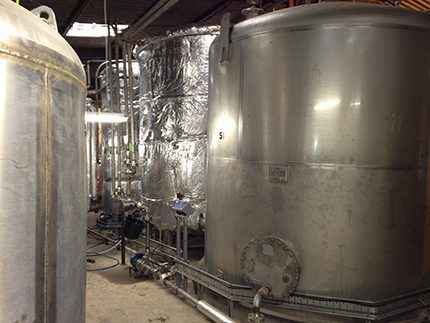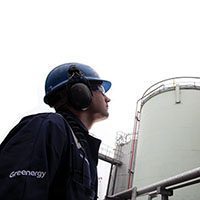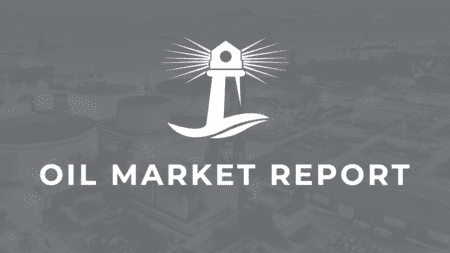
Expansion amongst other things has been high on the agenda for Top Oil this year. Having recently signed deals with two new authorised distributors, the company is committed to developing its brand and maintaining its foothold as a market leader across the fuel sector.
John O’Donovan, national reseller manager with Top Oil says the company prides itself on providing a true end-to-end solution from port to pump, to ensure the best quality products for Irish consumers.
New partnerships
Talking to Fuel Oil News’ Irish correspondent, Aine Faherty, he outlined how the group has concentrated on forming partnerships with/supporting authorised distributors across the country. “The investment we’ve made in the brand over the last 12 months has been very well received,” he explained.
Whilst in recent years, Top has seen the industry move away from contracted and branded distributors, the company believes that this has shifted, with distributors now recognising the importance of having a national brand on their fleets and in their depots. “With some uncertainty on how supply lines will develop over the coming years, distributors are re-evaluating their position and this is working in our favour,” adds John.
He believes that it’s not just price attracting resellers to the brand, but also the extra support and backup it offers. “The last few years have been difficult for oil distributors, volumes have fallen and there are tighter margins,” he told Fuel Oil News. “Distributors have had to adapt to facilitate lower order sizes, overhead reductions and changing customer credit culture.”
Killarney Oil is one of Top Oil’s newest authorised distributors. As a business that has been operating since 1991, it supplies the domestic, commercial and agricultural sectors in the County Kerry tourist town, as well as the hospitality sector – servicing a large number of hotels and B&Bs.
According to Asumpta O’Donoghue, who manages Killarney Oil with brother,
James, the company chose to partner Top Oil because it is a national brand with a well established network across the country, and in particular, Kerry. “We believe that by being a branded distributor, delivering quality assured products, it gives our customers peace of mind,” she commented.
Asumpta also believes that the business support and advice they get from the Top Oil team is an important aspect of the partnership. “They keep us up to date on changes in the industry, stock management, credit, pricing and marketing. Last winter when there were issues with kerosene supply across the country, we were always supplied with product, which was invaluable.”
With a clear focus on developing its network of authorised distributors, Top Oil’s latest signing is Doran Oil of Cashel, Co Tipperary, bringing the total number of distributors to 30.
The 13th Tank Storage Association (TSA) conference and exhibition took place at Coventry’s Ricoh Arena in September. A well attended event, registration topped 400 and exhibitor numbers doubled to over 60.
Focusing on HSE compliance and process safety management, the morning conference was chaired by Peter MacKay, managing editor and publisher of Hazardous Cargo Bulletin. The concensus among the first five speakers was that whilst the industry has come a long way, there is further to go.
“From an economic perspective, Immingham is a very important hub in the UK’s infrastructure,” says Keith L Jackson, director of Immingham Storage Company, part of Simon Storage.
In addition to being home to Simon’s Immingham East and West terminals, the Humber Estuary has two refineries which together supply over 20% of the UK’s refined product – Total’s Lindsey and Phillips 66 Humber, the latter specialising in petroleum coke for export.
The Associated British Ports’ (ABP) Immingham Dock & Grimsby Ports receive between 55-60m tonnes of cargo a year, of which approximately 22m tonnes are oil products. Immingham Storage handles large quantities of oil products, including many niche and specialised refined products. Fuels represent around 40% of the Simon business; a licence to store crude oil was surrendered in 2007 but recent enquiries may change this position.
The two Immingham terminals operate via two deep water jetties with 6 berths owned by ABP; each can accommodate ships up to 50,000 DWT. Approximately 50 ships a month call at the West terminal to deliver or collect products, with 25 ships a month using the East terminal.
Together, Immingham East and West comprise the UK’s largest terminal of its type, handling up to 1.5m tonnes of product a year with over 600,000m3 of storage.
Growth in the East terminal, managed by Andrew Rhodes, has largely been both by organic development and by acquisition; an ex liquid sulphur terminal, the most recent purchase, was acquired three years ago. The terminal, with up to 14” import/export lines and easy-to-convert tanks, offers significant flexibility as recently witnessed by the conversion of some capacity to gasoline standard post Buncefield with Safety Instrumented Systems. The facility can offer food grade product storage, as well as pressurised chemical gases. Installed 18 months ago, the East has a holding tank for effluent which then feeds into a bioreactor tank for treatment before being discharged into the Humber under an environmental permit. The West terminal, which has a similar system in place, can additionally recover up to 250 tonnes of water per day for reuse in other applications.
Fuel Oil News editor, Jane Hughes was invited to take a tour of Immingham Storage to see the operations first hand.
Managing a capital intensive business
Established in 1929, creosote was the first product stored by Immingham Storage at the West terminal before being exported to the USA.
Like much of the UK’s terminal infrastructure, both terminals were largely developed in the mid-1950s. Texaco and Esso (sea fed from Fawley) had terminals in the area – both acquired by Simon as part of the development of what was to become the East terminal.
It takes a 100-strong team, working 5 shifts daily round the clock 365 days a year to receive and deliver products, and to take care of routine maintenance, breakdown, out of service inspections and project work such as changing product in a tank or updating systems/infrastructure. Some projects, like a current one to replace electrical infrastructure, will end up costing over one million pounds and take up to four years to complete. Seeking to maintain a good level of control, project management work is handled internally, with Simon developing its own conceptual and then detailed design, tendering, selection of contactors and management of project delivery through to project commissioning and handover to the terminal.
Over £2m is spent on capital maintenance projects annually, primarily to tackle ageing plant issues. In addition to the ‘routine’ tank inspections – there are 137 tanks in the West and 104 in the East. Keith told Fuel Oil News: “The big push is now on the site’s key arteries, its pipework.” Visual detailed checks, radiography and NDT techniques are among the methods used to identify corrosion, poor quality welding and other defect issues. At the West 95% of tanks are the original build although many have had major refurbishment work performed, including new floors and bases installed, as a result of the ongoing inspection and refurbishment programme. The cost to rebuild three tanks recently was £5m. Some ten tanks have been totally replaced on the West terminal alone as a result of this inspection programme.
“This is the proverbial Forth Bridge – we’re constantly seeking to identify potential problems and then fixing them – making it a very capital intensive business,” explained Keith. “We audit ourselves and our contractors – we step in early to correct so that any identified poor practice, be it safety related or quality of delivery, is not allowed to escalate. This is a human intensive process and virtually a permanent construction site with up to 100 contactors on site at any one time.
“For example, we’re currently studying the site fire system – which was built some 25 years ago. Life’s moved on so we’re assessing ours against current best practice and expect to spend a not insignificant sum on making the system fit for the next 25 years of its life.”
With energy costs to run the sites a big consideration, a biomass boiler, rather than an oil one, is being considered for steam production. It is hoped that a mix of energy sources will give some protection against future energy price fluctuations.
Coping with the legacy of Buncefield
“The industry’s head went down in a big way post Buncefield,” said Keith. “Working with regulators, the industry took a long, hard look at how it conducted itself in order to learn from the incident. Simon, in common with the rest of the sector, has spent much time and money in improving technical competence as well as its infrastructure; we now have a much better structure in place to effectively control Major Accident Hazards as well as better and more demonstrable safety leadership.
“Born out of Buncefield, the implementation of the containment policy has made a huge change around the site. New bund walls have had to be constructed extending up to three metres below ground. Boreholes enable regular samples to be taken to monitor groundwater quality and movement. We’ve spent over £2m on work so far at Immingham that is necessary to give us a licence to stay in business.
Working in a changing storage world
“The storage industry has seen a lot of change over the last few years; as oil and chemical majors have retreated, we’re working more with oil and chemical traders and wholesalers. The latter are part of a logistics chain rather than original manufacturers, meaning that customer technical expertise has dwindled and the level of contact and information quality has declined.”
Simon does draw on in-house expertise – its safety team is headed by a chemistry PhD, and there are specialists in environment, mechanical, electrical/control engineering and human behaviour – and, being part of a larger group, there is usually someone with the right knowledge to help handle any new specialised product.
The retail market has become increasingly difficult with an overall decline in consumption, and dieselisation of the car fleet. The UK is now a net importer of diesel and adding ethanol to gasoline, which is in oversupply, for RTFO purposes has exacerbated its market problems further. International product imbalances have removed traditional dumping grounds for gasoline from Europe. “It’s a buy one, get one free market, where gasoline is taken in return for a deal on diesel from UK refiners,” said Keith. “We are pleased that from a standing start, our customer, Prax Petroleum, has been successful in growing its commercial business here at Immingham against this background of a difficult market.
“We’ve been reasonably successful in attracting new chemical business,” said Keith. “It’s a market dear to our hearts and one in which we have much technical expertise. REACH has had the effect of driving out hazardous chemicals from the market, particularly toxics. Regulatory pressure in Europe means it’s increasingly difficult to operate here; much manufacturing has gone to the Far East where there’s little equivalent environmental legislation. New world scale plants offer economies of scale and levels of manufacturing integration and sophistication that are simply not achievable in European plants that were often constructed in the post war period. Coupled with structural changes, manufacturing businesses closing, and supply contracts ending, it’s a sad reflection of a chemical manufacturing sector in decline.
“In February 2014 COMAH, after amendment under SEVESO III, will classify fuel oil as Dangerous for the Environment. For a market that’s not great right now and has not been historically strong, this additional legislation will be another challenge. Traditionally a lower end product in the market, this new classification has the potential to introduce significant new costs to the storage of this fuel which is already seeing reduced volumes.
“Marine fuel also has issues. As ship operators look to move away from heavy fuel oil as a result of SECA (Sulphur Emissions Control Areas), we face the biggest change since shipping moved from coal to oil. Government sponsored Navy oiling stations around the world provided physical impetus for the change from coal to oil burning ships of the line and the merchant fleet at the turn of the 19th century; now we face a new transition. LNG is mooted as the new marine fuel of choice but its storage, shipping and distribution are extremely difficult and hence expensive; there are no current standards for bunkering and little infrastructure on the ground and no national need to drive through change. LNG storage has been built in Rotterdam (GATE) and in the UK at the Isle of Grain, amongst other UK/European locations. However, these were not designed with ship bunkering specifically in mind or indeed any break bulk activity for onward distribution, although clearly these are under consideration now. Construction of smaller scale distribution and bunkering sites at other main UK ports is a possibility but we are a small island where typically no one wants LNG storage in their back yard. However Simon will look at opportunities in this field and, if there’s half a chance of making it work, we’ll explore the relevant avenues to develop concepts on a commercial basis.”

With most biodiesel currently traded through the Rotterdam barge market, one UK company has revealed ambitious plans to convince the UK that home grown biodiesel from waste is the way forward
Having set out to develop a ‘robust and flexible business model around low grade waste vegetable oils’, RGM Fuels (see page 6 Fuel Oil News July) is now in contract talks with several household names and fuel distributors.
“We’re at the stage of finalising volumes and prices with companies,” entrepreneur and investor Gordon McLure, told Fuel Oil News editor, Jane Hughes on a recent visit.
By combining waste with clever chemistry, Gordon, together with colleagues Dr Richard Jackson (PhD chemistry) and Dr Matthew Davies (PhD engineering), convinced investors of what RGM Fuels could bring to the market; a deal was signed with a private equity investor in 2011.
“Using a system specifically designed to process waste vegetable oils, we set out to produce biodiesel from waste to a very high standard,” added Gordon. “Developed by Richard and Matthew, our unique technology enables even very low grade vegetable oils to be processed; arguably this produces the most sustainable biodiesel available.”
High standards – convincing the market
Historically focusing on virgin seed oils, such as soy and palm oil, much investment was made in the original biofuel market, then the food v fuel debate arose and the sustainable fuel image was tarnished. An emotive topic, the food v fuel debate together with quality issues over biodiesel made from waste cooking oil in what was then a cottage industry, left a poor perception of biofuel and the industry acquired a cowboy image. Low grade feedstock led to badly made biodiesel, quality issues and fuel degradation whilst a DIY biofuels market grew up with carte blanche to make a little bit of diesel without paying any tax. Branded as unsustainable, biodiesel quality was questioned with a multitude of reasons proffered as to why it should not be used.
Distancing itself from this tarnished image has proved to be a challenge; but as companies increasingly look to support their corporate social responsibility policy, RGM Fuels reports that interest in biodiesel is growing again.
“The transition from seed to waste feedstock saw huge variations in the quality of biodiesel so there was a lot of resistance to what was seen as an unreliable product,” explained Gordon. “If made properly biodiesel from waste is totally reliable; in fact it can have standards more exact than those for mineral diesel. Once barriers have been overcome, hoops jumped and trials undertaken, we’ve been able to convince people of the product’s worth.”
Practising what it preaches, the team fuels its own vehicles with 100% biodiesel. “Presently, the B100 market is limited in the UK as the market is ignorant of its capabilities,” Matthew explained.
Down on the farm
A tree lined drive leads down to Quarry Hill Farm, the site of RGM Fuels first biodiesel plant, commissioned at the end of last year. Situated in the village of Lathbury in rural Buckinghamshire, the plant, which can produce up to 100 tonnes a day, was built as a pilot plant to prove the technology and the model.
“Setting up a biodiesel plant is not for the faint hearted. It’s easy to make biodiesel, but it’s very difficult to make biodiesel well,” said Matthew whose enthusiasm for the plant, which he likens to a giant Meccano set, is infectious.
With their specialist knowledge in chemical reactors, Matthew and Richard dismissed the expensive cracking and cooking method for esterification, favouring instead a reactor system that enables the use of a broader feedstock range which can be continually, rather than batch, processed. The system is also currently in use at plants in South Africa and in Memphis, Tennessee.
“We’ve kept the process lean and mean – new state of the art equipment sits with secondhand tanks and by speeding the process up, batch quality is more easily controlled.” Nothing is wasted with the glycerine produced in the process also sold.
“This plant was primarily set up for demonstration purposes, hence the secondhand tanks,” explained Gordon. “A new dockside plant is planned to allow us to scale up to a much larger production enabling product movements in and out by ship.” In the meantime, there are interim plans to expand the farm plant and/or buy an existing plant and convert it to run on RGM specific reactors.
“It’s amazing how things can improve when you really put your mind to it,” Mark Nicholls, general operations manager at NWF Fuels, told Fuel Oil News editor, Jane Hughes on a recent visit to the Group’s head office near Nantwich in Cheshire.

Investment at Greenergy
The last year has been a busy one for Greenergy, with major infrastructure projects at former Petroplus facilities on the Thames and at Teesside, combining with strong sales growth.
The company’s 2012/13 sales amounted to 13.5 billion litres, up 24% in volume from the previous year. Chief executive, Andrew Owens, commented: “We have won new business following the administration of Petroplus and also by expanding our supply to independent petrol retailers. We now supply independent dealer owned petrol stations under a variety of different forecourt brands, including Esso and the Nisa convenience brand.”
Greenergy acquired the former Petroplus refinery on Teesside (now named Greenergy North Tees) in July 2012 and began supplying from the site soon after. North Tees has become the company’s second supply location in the area, complementing its petrol blending facilities at the neighbouring Vopak terminal.
Andrew explained: “We can now supply customers from both Greenergy North Tees and from the Vopak terminal at Seal Sands so if ever there is an interruption of supply at one of these sites, we can seamlessly switch customers to the other. This allows us to offer our customers unparalleled resilience of supply.”
Up until the mid 1980s, oil companies in the UK were self sufficient in the ownership and management of their road tanker fleets.
In 1985 a wind of change started to blow when Amoco decided to outsource its mainline delivery operations to haulage contractor Wincanton. Since then, the outsourcing of road delivery operations has become the norm in the oil products’ supply chain, based on the rationale that it is not considered to be a core competency in an oil company’s downstream business.
Logic dictated that logistics was a task best left to those specialising in owning and operating truck fleets i.e. haulage contractors. In addition to the physical delivery operation, contractors typically provide three key supporting activities – order taking, scheduling and routing. In many instances they also provide stock reconciliations and replenishment planning/management. Taking this a stage further, contractors have deployed unbranded or white tankers to facilitate their various delivery activities, providing scope for enhanced efficiencies and cost savings.








